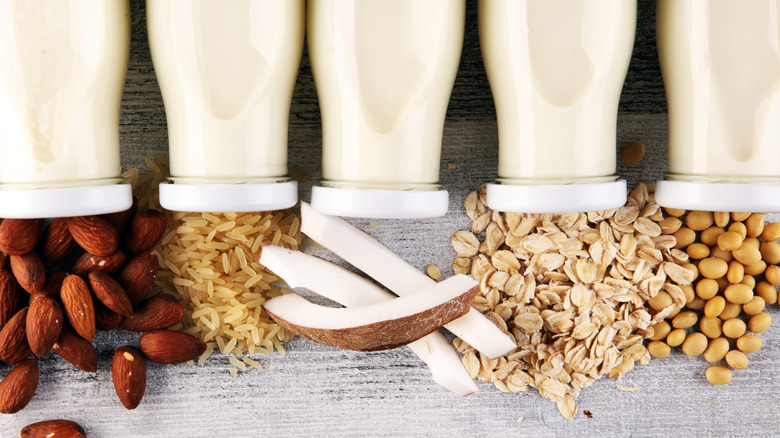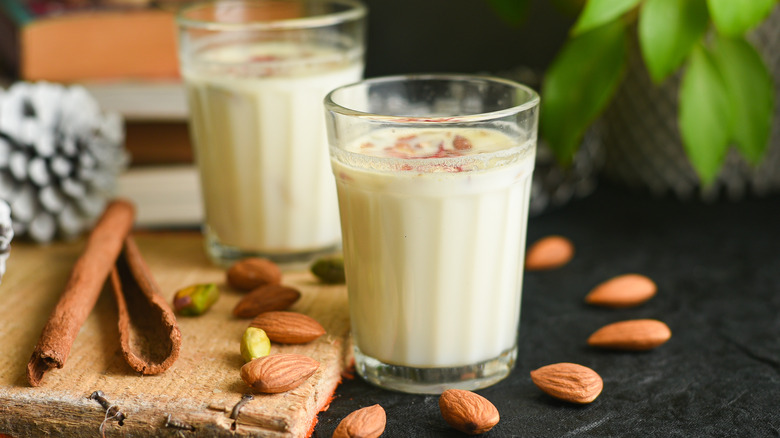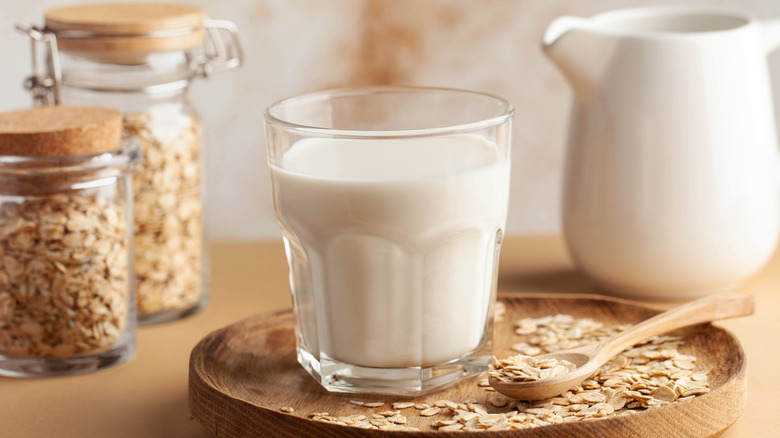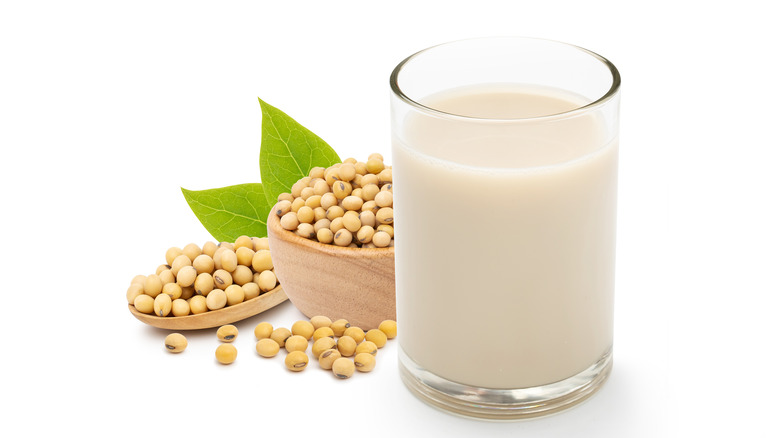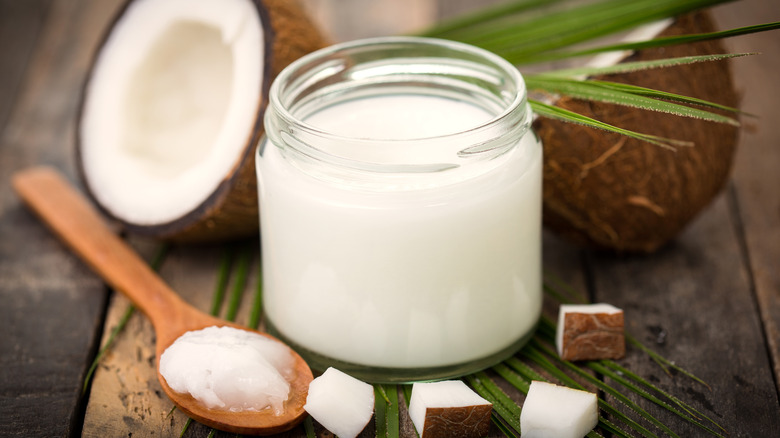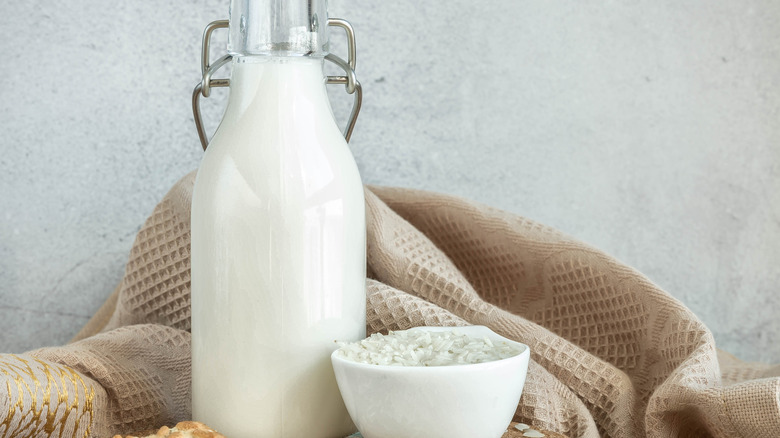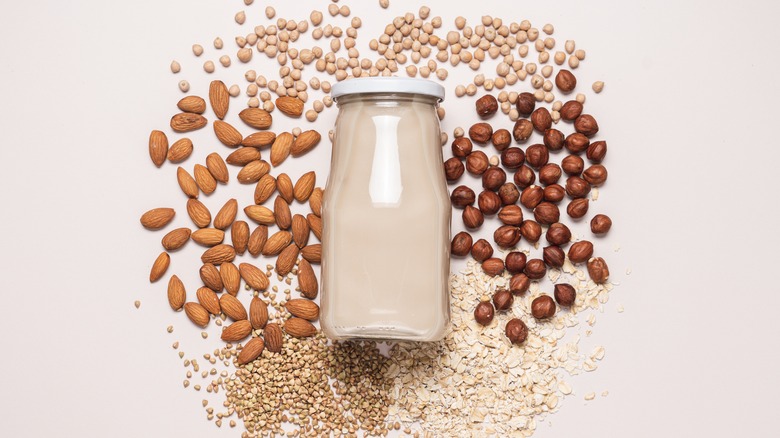Plant-Based Milks That Aren't As Good For The Environment As You Thought
Many people drink coffee to jump-start the day. Who doesn't love the smell of fresh ground coffee in their own kitchen in the morning? According to Healthline, coffee has caffeine, a stimulant that gives you energy, helps you stay awake and alert during the day, and might even help you lose weight. Many people take their coffee black; then we have the latte lovers, and there are a lot of them. Latte, short for "caffé latte," is actually the most popular coffee drink in the U.S., and all it needs is espresso and steamed milk (via Eat This, Not That!). Of course, you can always jazz it up with some caramel or mocha because the options are endless.
Whole milk still takes the cake for being the most popular option for lattes, while skim milk is another go-to for people who prefer a low-calorie option, per Whole Latte Love. Still, others, whether for dietary needs or simply personal preference, opt for nondairy milks in their lattes. The same goes for vegans, who do not consume any animal products. New Food Magazine reported that the rise in nondairy or plant-based milks is because many people, especially "'mainstream' and flexitarian consumers," are switching to it despite not having any dietary restrictions.
They perceive the alternative as "healthier," as most plant-based milks (except coconut) have lower calories than dairy milk. What many people don't know is how plant-based milk ingredients are sourced, and how they affect the environment.
Almond milk
In the world of plant-based milk, almond milk is the number one selling milk in North America, and though you might think milk alternatives are a new innovation, people in the Middle East were using almond milk as early as the 13th century, per Food Manufacturing. According to Healthline, almond milk is rich in vitamin E and has fewer calories and protein than cow's milk. Almonds are very healthy, but there is one big problem with almond milk.
California produces over 80% of the world's almonds, and they require a lot of water to grow (via FoodPrint). A study revealed that one almond needs about 3.2 gallons of water, so they leave a significant water footprint compared to plants that require less water. Of course, it grows mainly in California, where there is a scarcity of water already, so it's not exactly eco-friendly. Plus, with all the processing and dilution with water, it loses most of its nutritious value, so you might just benefit from eating actual almonds rather than drinking almond milk.
Oat milk
According to Food Dive, oat milk is the second most popular choice among plant-based milks, and compared to its counterparts, like soy, almond, and cow's milk, it releases less carbon dioxide since it is more ecologically friendly. Moreover, oats don't require too much water or land to grow. It's ultimately one plant-based milk that you can easily make at home. Regarding its nutrition value, it has more carbohydrates and less protein than cow's milk like other plant-based milks, but it is richer in fiber, per Shape. It's vegan, but you have to check the label if you want gluten-free options, as it is often processed with gluten grains.
Oat milk brand Oatly conducted a life-cycle assessment study in Sweden that showed that oat milk production produces "80 percent lower GHG emissions and 60 percent less energy use compared to cow's milk," so it's not that bad (via FoodPrint). What you should know about oat milk is that some farmers spray oat crops with glyphosate, unless it is organic. This is bad because, as noted by WebMD, glyphosate can potentially cause cancer. Nevertheless, oat milk is one such plant-based milk that's easy to make without the mess.
Soy milk
Soy milk is a popular non-dairy alternative that is made from soybeans. On this drink, plant-based-food dietitian Julieanna Hever told Everyday Health, "Soy milk offers culinary diversity, creamy texture, and a healthful nutritional profile, including essential omega-3 fatty acids [if fortified] and flavonoids that exert antioxidant, anti-inflammatory, and cardioprotective properties."
Many brands add vitamins and nutrients to it to make it more nutritious, and it's considered the healthiest among other plant-based milks. It's also pretty popular, which could be why it harms the environment. A study by the University of Nottingham and the Sustainable Food Trusts says that large areas of rainforests are being cleared to make space for soy farming, with animals suffering from habitat destruction, which affects the ecosystem (via Food Ingredients First). Richard Young, Policy Director of the trust, told the outlet, "Soybean meal has a very high carbon footprint if derived from crops grown on land recently converted from forest or savannah."
Soy milk might be healthy, but it doesn't look like it's doing the environment any favors.
Coconut milk
Coconut milk is rich and tasty. It comes from the fleshy part of the coconut and is often used in Asian cuisine, but the ones you use as a milk alternative are less dense than the coconut milk that comes in a can, per Verywell Fit. Compared to other non-dairy milks, coconut milk has more fat and is more expensive. When you drink coconut milk every day, therefore, you might need to lower other sources of fat to balance it. Still, according to Food Network, it is rich in vitamin B12, but it doesn't have any protein, though it makes super foamy lattes and smoothies.
The issue with coconut milk is more ethical because it grows in tropical lands. There are always labor and wage issues to keep in mind, leading to mass production, but that cannot happen without over-farming (via Clean Technical). You must consider that it doesn't grow everywhere in the world and has to be shipped everywhere, and that comes with a hefty load of carbon emissions. They recommend doing your research to see how companies treat their workers before buying your next carton of coconut milk.
Rice milk
Rice milk, also called rice drink, naturally comes from rice. According to Verywell Fit, rice milk is rich in calcium and vitamin A and has a reasonably low fat and protein content but a high glycemic index. This non-creamy milk substitute is hypoallergenic, so it is safe for people allergic to dairy, lactose, soy, and gluten, per Food Network.
One of the biggest cons of rice milk is that an Oxford study showed that it is "one of the worst offenders for greenhouse gas emissions" compared to all other milk substitutes (via Whole Earth Sea). Rice paddies also require a lot of water to grow, resulting in more methane-producing bacteria, which doesn't help the planet. The Conversation reported that rice milk can contain high quantities of arsenic due to the amount of fertilizers used, which ultimately pollutes rivers and streams, too.
So, what plant-based milk is best?
As we can see, plant-based milks don't exactly help the planet, but neither does dairy farming. FoodPrint pointed out that you have to consider factors like "greenhouse gas (GHG) emissions, water use, land use, chemical runoff and soil degradation" from the time it is grown, the processing method, packaging, transportation, and preservation each milk requires, which can differ from one brand to another.
From what we learned, oat milk might be the most environmentally friendly, but it does pack the extra carbs that other plant-based milks don't have. The New York Times reported that, though plant-based milk can be healthy, it cannot replace the nutrients in dairy milk. Some people tend to identify themselves with their choice of milk alternative — are you a soy person or an oat person? — but it might be best to learn how the milk makes it to your grocery store before making a selection. Ultimately, the truth about plant-based milks is that they're just as complex as dairy milk, including in if they're actually ethical to consume or not.
